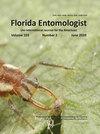Tenuipalpus uvae (Acari: Tenuipalpidae) and Calophya spondiadis (Hemiptera: Psyllidae), pests of Spondias in Florida, USA
IF 1.2
4区 农林科学
Q3 ENTOMOLOGY
引用次数: 0
Abstract
Summary Two main pests were found attacking purple mombin or Spanish plum, Spondias purpurea (Sapindales: Anacardiaceae) in Homestead, Florida, USA: Tenuipalpus uvae De Leon (Acari: Tenuipalpidae), a flat mite damaging the leaves, and the spondias psyllid, Calophya spondiadis Burkhardt & Mendez (Hemiptera: Psyllidae) feeding on the flowers, fruitlets, and tender expanding leaves. Tenuipalpus uvae populations are composed principally of females. Female longevity was 13.1 ± 2.0 d and unmated females oviposited 5.0 ± 1.0 eggs in their lifetime. On average, eclosure time for eggs from laboratory-reared unmated females was 10.2 ± 0.1 d, and developmental times for the larva, protonymph, and deutonymph were 6.6 ± 0.4 d, 5.7 ± 0.2 d, and 6.8 ± 0.7 d, respectively. In a survey of S. purpurea leaflets, the upper surface had a significantly higher number of nymph and adult mites (6.43 ± 0.60) than the lower surface (2.29 ± 0.35). Calophya spondiadis laid their eggs on flowers at first, because these were the first to sprout in Jan, and they were heavily infested by the end of Mar with an average of 10.9 ± 1.5 eggs and 9.6 ± 1.1 nymphs per flower. Few eggs or nymphs (0.17 ± 0.17 and 0.08 ± 0.08, respectively) were found per fruit; nonetheless, the fruit did have multiple punctures or necrotic spots (16.7 ± 4.3 per fruit), likely acquired as nymphs fed on the flowers and their ovaries. Significantly more eggs were found on the upper surface of the leaves and the petiole portion adjacent to each leaflet than the underside of the leaves, and most nymphs migrated to the undersides. The feeding damage resulted in black, necrotic spots that became brown pits as the leaves matured and hardened.在美国佛罗里达州Homestead发现了两种主要的害虫:一种是破坏叶子的扁平螨,一种是破坏叶子的刺螨(Tenuipalpus uvae De Leon);另一种是以花、果实和幼嫩的叶子为食的刺螨(Spondias spondiadis Burkhardt & Mendez),半翅目:刺螨科。小叶蛛种群主要由雌性组成。雌虫寿命为13.1±2.0 d,未交配雌虫一生产卵5.0±1.0个。实验饲养的未交配雌虫卵的平均闭合时间为10.2±0.1 d,幼虫、原淋巴细胞和双淋巴细胞的发育时间分别为6.6±0.4 d、5.7±0.2 d和6.8±0.7 d。在紫荆小叶调查中,上表面的若虫和成螨数量(6.43±0.60)明显高于下表面的(2.29±0.35)。1月花最早发芽,因此棘球蛾先在花上产卵,到3月底侵染严重,平均每花产卵10.9±1.5个,雌雄虫9.6±1.1个。每果卵或若虫数较少(分别为0.17±0.17和0.08±0.08);尽管如此,果实确实有多个刺穿或坏死点(每个果实16.7±4.3),可能是若虫以花和子房为食而获得的。在叶的上表面和叶柄处发现的卵明显多于叶的下侧,并且大多数若虫迁移到叶的下侧。取食损害导致黑色坏死斑点,随着叶片成熟和变硬而变成棕色坑。
本文章由计算机程序翻译,如有差异,请以英文原文为准。
求助全文
约1分钟内获得全文
求助全文
来源期刊

Florida Entomologist
生物-昆虫学
CiteScore
2.10
自引率
7.10%
发文量
44
审稿时长
3 months
期刊介绍:
Florida Entomologist is the official journal of the Florida Entomological Society. Volumes 1-3 were published under the name The Florida Buggist. The Florida Entomological Society still produces the traditionally printed version of Florida Entomologist, but you can also view, search, or print any article published since June 1917 by accessing online files. Web access is made possible by the Society’s electronic publication project begun in 1993
 求助内容:
求助内容: 应助结果提醒方式:
应助结果提醒方式:


